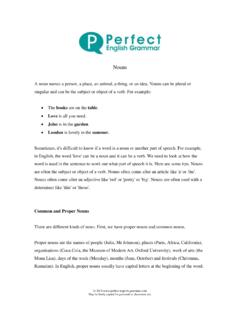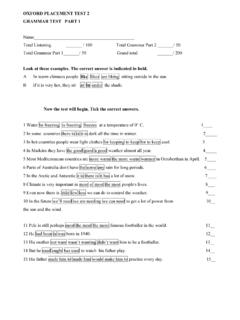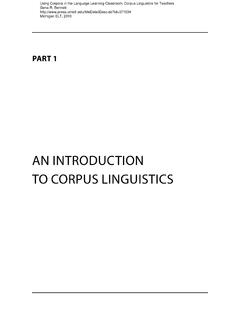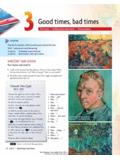Transcription of Oxford University Press
1 Oxford University PressWalton Street, Oxford 0X2 6 DPOxford New YorkAuckland Bangkok Buenos Aires Cape TownChennai Dar es Salaam Delhi Hong Kong IstanbulKarachi Kolkata Kuala Lumpur Madrid MelbourneMexico City Mumbai Nairobi S o Paulo ShanghaiSingapore Taipei Tokyo Torontowith an associated company in BerlinOXFORD and Oxford ENGLISHare trade marks of Oxford University PressISBN 0 19 431351 4 (paperback)ISBN 0 19 431334 4 (hardback) Oxford University Press 1994 First published 1994 Seventh impression 2002No unauthorized photocopyingAll rights reserved. No part of this publication may bereproduced, stored in a retrieval system, or transmitted, inany form or by any means, electronic, mechanical,photocopying, recording, or otherwise, without the priorwritten permission of Oxford University book is sold subject to the condition that it shall not,by way of trade or otherwise, be lent, resold, hired out, orotherwise circulated without the publisher's prior consentin any form of binding or cover other than that in which it ispublished and without a similar condition including thiscondition being imposed on the subsequent by Heather ClarkeTypeset in Utopia byTradespools Ltd, Frome.
2 SomersetPrinted in Hong KongContentsIntroduction VIIA cknowledgements VIIIKey to symbols IXSentence and text1 english grammar 12 The simple sentence 63 Statements, questions, imperatives and exclamations 154 Questions and answers 255 Leaving out and replacing words 426 Information and emphasis 527 Spoken english and written english 64 Verb forms8 The verb phrase 759 Verb tenses and aspects 8210 The future
3 9511 Be, have and do 10412 Modal verbs 11313 The passive 130 Infinitive, gerund and participles14 The infinitive 14415 The gerund 15916 Participles 167 The noun phrase17 Nouns and noun phrases 17518 Agreement 19119 The articles.
4 A/an and the 19820 Possessives and demonstratives 21321 Quantifiers 21922 Pronouns 23323 Numbers and measurements 245 Adjectives, adverbs and prepositions24 Adjectives 25125 Adverbials 26026 Comparison 27827 Prepositions 28628 Phrasal verbs and patterns with prepositions 302 Main clauses and sub clauses29 Sentences with more than one clause 31730 And, or, but.
5 So etc 32331 Adverbial clauses 32732 Conditional clauses 33333 Noun clauses 34134 Direct and indirect speech 34635 Relative clauses 356 Word forms36 Word-building 36737 Word endings.
6 Pronunciation and spelling 37638 Irregular noun plurals 38039 Irregular verb forms 382 Appendix40 American english 389 Glossary 397 Index 404 IntroductionThe Oxford Guide to english grammar is a systematic account of grammaticalforms and the way they are used in standard British english today.
7 The emphasis ison meanings and how they govern the choice of grammatical book is thorough in its coverage but pays most attention to points that are ofimportance to intermediate and advanced learners of english , and to theirteachers. It will be found equally suitable for quick reference to details and for themore leisured study of broad grammar useful feature of the book is the inclusion of example texts and conversations,many of them authentic, to show how grammar is used in connected writing andin changes all the time. Even though grammar changes more slowly thanvocabulary, it is not a set of unalterable rules. There are sometimes disagreementsabout what is correct english and what is incorrect. 'Incorrect' grammar is oftenused in informal speech. Does that make it acceptable?
8 Where there is a differencebetween common usage and opinions about correctness, I have pointed this information is important for learners. In some situations it may be safer forthem to use the form which is traditionally seen as correct. The use of a correctform in an unsuitable context, however, can interfere with understanding just asmuch as a mistake. To help learners to use language which is appropriate for agiven occasion, I have frequently marked usages as formal, informal, literaryand so to use this bookAny user of a reference book of this kind will rely on a full and efficient index, as isprovided in the Oxford Guide (pages 404 to 446). In addition, there is a summary atthe beginning of each chapter which gives a bird's eye view, with examples, of thegrammar covered in the chapter as a whole and gives references to the individualsections which author and publisher would like to thank all the teachers in the UnitedKingdom and Italy who discussed this book in the early stages of its are also grateful to John Algeo, Sharon Hilles and Thomas Lavelle for theircontributions to the chapter on American english and to Rod Bolitho, SheilaEastwood and Henry Widdowson for their help and addition, we would like to thank the following, who have kindly given theirpermission for the use of copyright material: Bridgwater Mercury; CambridgeUniversity Press ; Consumers' Association, London, UK; Fodor; Ladybird Books.
9 The Mail on Sunday; Nicholson; Octopus Books; Rogers, Coleridge and White;Mary Underwood and Pauline are instances where we have been unable to trace or contact copyrightholders before our printing deadline. If notified, the publisher will be pleased toacknowledge the use of copyright to symbolsPhonetic symbolshousemustnextsongloverestyouwillf irstvanthreethissellzooshippleasureputbe sttelldaycatgoodcheesejustbirdawaypaysoc rynowboydearchairsureteasittenhadcardogb allbookfoolcup(r) fourfour applesfour bananaslinking r, pronounced before a vowel but (in British english ) notpronounced before a consonantstress follows, aboutfalling intonationrising intonationOther symbolsThe symbol / (oblique stroke) between two words or phrases means that either ispossible. I will be/shall be at home tomorrow means that two sentences arepossible: I will be at home tomorrow and I shall be at home also use an oblique stroke around phonetic symbols, teaBrackets ( ) around a word or phrase in an example mean that it can be left 've been here (for) ten minutes means that two sentences are possible: I've beenhere for ten minutes and I've been here ten symbolmeans that two things are related.
10 Discussdiscussion meansthat there is a relationship between the verb discuss and the noun symbol ~ means that there is a change of symbolthere is more information. For example,is a reference to another section and/or part of a section where(2) means part 2 of the same section;229(3) means part 3 of section means section 65; and1 english grammar1 SummaryGrammatical units 2 The grammatical units of english are these: word, phrase, clause and classes 3 The main word classes are these: verb, noun, adjective, adverb, preposition,determiner, pronoun and 4 There are these kinds of phrase: verb phrase, noun phrase, adjective phrase,adverb phrase and prepositional elements 5 The sentence elements are these: subject, verb, object, complement and compared with other languages 6 english words do nor have a lot of different endings for number and order is very important in verb phrase can have a complex are many idioms with Grammatical unitsA FLIGHT ANNOUNCEMENT'Good evening, ladies and gentlemen.










